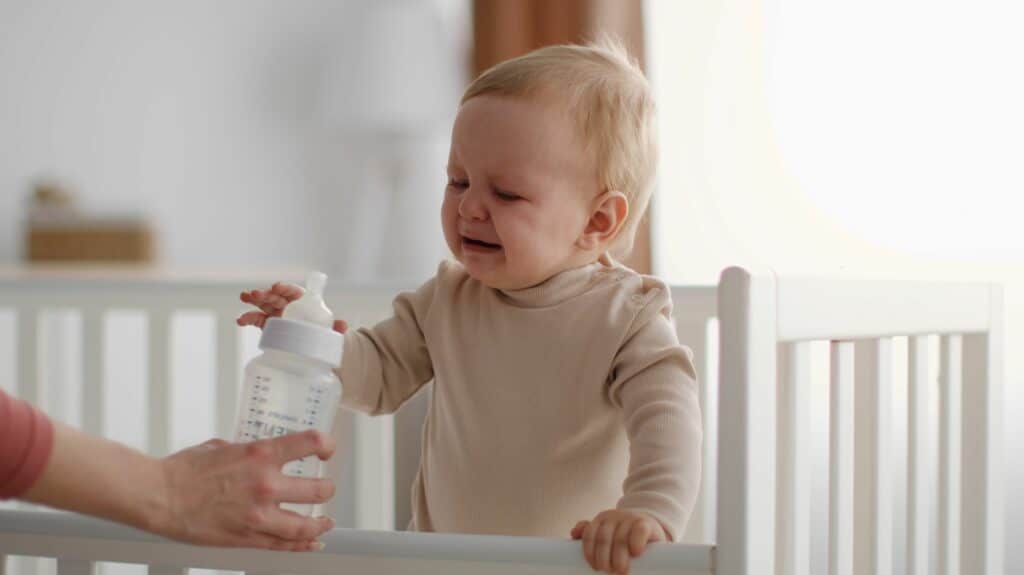Symptoms of baby drinking spoiled formula can range from mild to severe, depending on the length of time the formula has been spoiled and the amount ingested. Parents and caregivers must be vigilant when it comes to formula preparation and storage to avoid any potential health risks and complications. In this article, we will discuss the symptoms of baby drinking spoiled formula and what parents and caregivers can do to prevent it.
Identifying spoiled formula is the first step in preventing ingestion. Spoiled formula may have a sour or rancid smell, a curdled appearance, or a slimy texture. If the formula has changed in color or consistency, it may also be spoiled. Parents and caregivers must discard any formula that appears or smells off to prevent ingestion.
Immediate symptoms of ingestion may include vomiting, diarrhea, and stomach pain. These symptoms may occur within hours of ingestion and can last for several days. In severe cases, the baby may experience fever, dehydration, and difficulty breathing. Parents and caregivers must be aware of these symptoms and seek medical attention if necessary.
Key Takeaways
- Identifying spoiled formula is crucial in preventing ingestion.
- Immediate symptoms of ingestion may include vomiting, diarrhea, and stomach pain.
- Seek medical attention if the baby experiences severe symptoms or complications.
Identifying Spoiled Formula

A baby’s formula is a crucial part of their diet, and it is essential to ensure that the formula is still good to use before feeding it to the baby. Here are some ways to identify spoiled formula.
Visual and Smell Checks
One of the easiest ways to tell if the formula is spoiled is by checking its appearance and smell. If the formula looks clumpy or separated, it may be a sign of spoilage. Liquid formula should be smooth, and powdered formula should be free of clumps. If the formula separates into layers, it may be a sign of spoilage. Shake the formula well before using it. If it doesn’t mix well, it may be spoiled.
Another way to tell if the formula is spoiled is by smelling it. If the formula has a sour or rancid smell, it may be spoiled. Discard the formula if it smells off. Rancid smells are usually a sign that the formula has gone bad.
Understanding Expiration Dates
Another way to tell if the formula is still good to use is by checking the expiration date on the container. Most formula containers have an expiration date printed on the label. It is essential to check this date before using the formula. Using expired formula can cause harm to the baby’s health.
It is also important to note that the expiration date is only valid if the container is unopened. Once the container is opened, the formula’s shelf life decreases, and it should be used within a certain timeframe. Liquid formula should be used within 48 hours after opening, while powdered formula should be used within a month after opening.
In conclusion, it is crucial to check the formula’s appearance, smell, and expiration date before feeding it to the baby. By doing so, parents can ensure that their baby is getting safe and healthy nutrition.
Immediate Symptoms of Ingestion

When a baby accidentally ingests spoiled formula, they may experience immediate symptoms. These symptoms can range from mild to severe, depending on the extent of the contamination and the baby’s overall health.
Gastrointestinal Reactions
One of the most common symptoms of a baby drinking spoiled formula is gastrointestinal reactions. This can include diarrhea, vomiting, stomach pain, and nausea. The baby may have loose, watery stools that occur more frequently than usual. The stool may also have an unusual color, consistency, or odor. The baby may also vomit, which can lead to dehydration if not managed properly.
Allergic Responses
In some cases, a baby may have an allergic response to the spoiled formula. This can include hives, swelling, and difficulty breathing. If the baby experiences any of these symptoms, it is important to seek medical attention immediately.
It is important to note that not all babies will experience the same symptoms after ingesting spoiled formula. Some babies may not show any symptoms at all, while others may experience more severe symptoms. If you suspect that your baby has ingested spoiled formula, it is important to monitor them closely for any signs of illness. If you notice any unusual symptoms or behaviors, seek medical attention immediately.
Health Risks and Complications

If a baby drinks spoiled formula milk, it can lead to various health risks and complications. The severity of these risks depends on various factors such as the baby’s age, overall health, and the degree of contamination. Here are some of the most common health risks and complications associated with drinking spoiled formula milk:
Dehydration and Nutrient Loss
Spoiled formula milk can lead to dehydration and nutrient loss in babies. The harmful bacteria in the spoiled milk can cause diarrhea and vomiting, which can lead to fluid loss and nutrient deficiencies. Babies who are already weak or have a weak immune system are more susceptible to dehydration and nutrient loss.
Bacterial Infections and Poisoning
Drinking spoiled formula milk can also lead to bacterial infections and poisoning. Harmful bacteria such as Enterobacter sakazakii can contaminate formula milk and cause infections such as meningitis, sepsis, and necrotizing enterocolitis. These infections can be life-threatening, especially in babies with a weak immune system.
To prevent these health risks and complications, it is important to store and handle formula milk properly. Parents should always check the expiration dates on the formula container and discard any expired or spoiled formula milk. They should also follow the instructions on the formula container carefully and prepare formula milk in a clean and sterile environment.
In conclusion, drinking spoiled formula milk can lead to various health risks and complications in babies. Parents should be aware of the signs of spoiled formula milk and take necessary precautions to prevent any potential risks and consequences.
Safe Formula Preparation and Storage

Proper handling and storage of infant formula is crucial to prevent contamination and ensure the safety of the baby. Here are some guidelines to follow when preparing and storing infant formula.
Proper Handling and Hygiene
Before preparing infant formula, it is important to wash your hands and sanitize all utensils that will come into contact with the formula. This includes bottles, nipples, and any measuring cups or spoons. Proper hygiene is essential to prevent the spread of harmful bacteria that can cause illness in infants.
When preparing formula, follow the instructions on the container carefully. Use the recommended amount of water and powder and mix thoroughly until the formula is completely dissolved. It is also important to use water that has been boiled and cooled to the appropriate temperature to prevent contamination.
Storage Guidelines and Temperature Control
Once prepared, infant formula should be used immediately or stored safely. Formula that is not used immediately should be refrigerated at a temperature of 40°F or below. Formula that has been refrigerated should be used within 24 hours and discarded if it has been left at room temperature for more than 2 hours.
It is important to note that breast milk should be handled and stored differently than formula. Breast milk can be stored in the refrigerator for up to 4 days or in the freezer for up to 6 months. It is also important to use breast milk storage bags or containers that are specifically designed for this purpose.
In summary, proper handling and storage of infant formula is essential to ensure the safety of the baby. By following these guidelines, parents can help prevent contamination and ensure that their baby is receiving safe and nutritious formula.
When to Seek Medical Attention

If a baby has consumed spoiled formula, it is important to monitor them closely for any symptoms of gastrointestinal distress, such as vomiting, diarrhea, or unusual fussiness. However, in some cases, the symptoms can be more severe and require immediate medical attention.
If a baby experiences a high fever, seizures, or any other concerning symptoms, it is crucial to seek medical advice from a pediatrician or healthcare provider as soon as possible. These symptoms may indicate a more serious condition that requires prompt medical attention.
In addition, if a baby has consumed a large amount of spoiled formula or is showing persistent symptoms, it is important to seek medical advice to ensure that they receive appropriate treatment. A healthcare provider can provide guidance on how to manage the symptoms and prevent any potential complications.
Overall, if a baby has consumed spoiled formula and is showing any concerning symptoms, it is always best to err on the side of caution and seek medical attention. Prompt medical intervention can help ensure that the baby receives appropriate treatment and can help prevent any potential complications.
Frequently Asked Questions

What are the signs that a baby has consumed spoiled formula?
If your baby has consumed spoiled formula, there are a few signs you should look out for. These include vomiting, diarrhea, and stomach discomfort. The formula may also have a sour or rancid smell, and it may have changed in color or consistency. If you notice any of these signs, it’s important to seek medical attention right away.
How long after drinking spoiled formula will a baby show symptoms?
The symptoms of consuming spoiled formula can appear anywhere from a few hours to a few days after ingestion. The length of time it takes for symptoms to appear can vary depending on the amount of formula consumed and the baby’s overall health. If you suspect that your baby has consumed spoiled formula, it’s important to monitor them closely for any signs of illness.
Can consuming spoiled formula lead to food poisoning in infants?
Yes, consuming spoiled formula can lead to food poisoning in infants. Food poisoning can cause a range of symptoms, including vomiting, diarrhea, stomach cramps, and fever. In severe cases, food poisoning can lead to dehydration and other complications. If you suspect that your baby has consumed spoiled formula and is experiencing symptoms of food poisoning, seek medical attention right away.
What should I do if my baby has ingested formula that is several hours old?
If your baby has ingested formula that is several hours old, monitor them closely for any signs of illness. If your baby appears to be in good health and is not experiencing any symptoms, it is likely that they will be fine. However, if your baby does start to show signs of illness, seek medical attention right away.
Are there specific odors that indicate formula has gone bad?
Yes, there are specific odors that can indicate that formula has gone bad. Spoiled formula may have a sour or rancid smell, and it may have a curdled appearance or a slimy texture. If you notice any of these signs, do not use the formula and seek medical attention right away.
What are the risks associated with a baby drinking formula that was prepared a day ago?
Formula that has been prepared a day ago may not be safe for your baby to consume. The longer formula sits out, the more likely it is to become contaminated with harmful bacteria. If your baby drinks formula that was prepared a day ago, they may be at risk of developing food poisoning or other illnesses. It’s important to always prepare formula fresh and to discard any unused formula after feeding.

My name is Laura, and as a mother of two, I understand firsthand the joys and challenges of raising a child. That’s why I created this website, to provide a comprehensive and trustworthy source of information and support for new and expectant parents.

